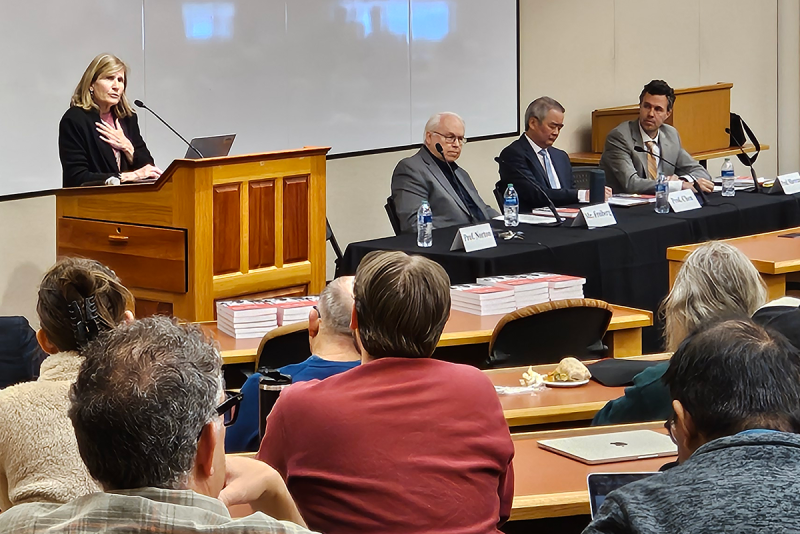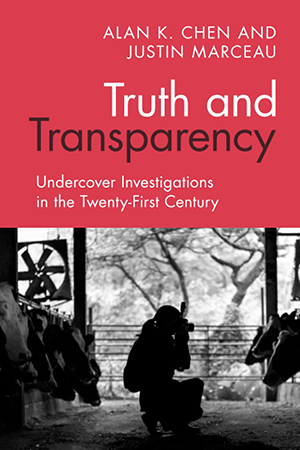DU Law Professors Publish Comprehensive Study of Undercover Investigations

University of Colorado School of Law Distinguished Professor Helen Norton (at podium) calls University of Denver Sturm College of Law professors Alan Chen (2nd from r) and Justin Marceau's (r) new book "the most original and comprehensive study of undercover investigations ever written."
From The Jungle to the Farm
In their recently published book “Truth and Transparency: Undercover Investigations in the Twenty-First Century,” University of Denver Sturm College of Law professors Alan Chen and Justin Marceau have undertaken a study that defines the practice of undercover investigation, contrasts it with investigative journalism, and places it within the context of First Amendment constitutional law. From Upton Sinclair’s The Jungle and the lesser-known “girl stunt reporters” of late 19th century Chicago to animal rights investigators at factory farms in the 21st century, Chen and Marceau provide a history of undercover investigations and trace the legal, technological, and social developments that continue to guide such investigations into the future.
At an event held at the Sturm College of Law on March 5, 2024, Helen Norton, who is a university distinguished professor and Rothgerber chair in constitutional law at the University of Colorado School of Law, called the publication “the most original, the most comprehensive, and the most important study of undercover investigations ever written.” Norton also described how Chen and Marceau’s book “is not only a story of law, but also of technology. More specifically, it’s a story about the implications of 21st century expressive technologies like the tiny cameras and recording devices almost every one of you is carrying with you today, like drones.”
The First Amendment and the Necessity of Deception
Norton concluded that “Alan and Justin offer what I found a very thoughtful and very principled set of guidelines for quality undercover investigations to maximize their morality and ethics, to maximize their possibility for withstanding constitutional [challenges], resisting regulation under the First Amendment.” In turn, Chen acknowledged that “Helen has also been with us from the very beginning of this project, when we first started working on this, about ten years ago, and has been as much a collaborator and supporter as you could possibly hope for.”
Also among the speakers at the event was Fred Freiberg, co-founder and national field consultant with the Fair Housing Justice Center. Freiberg recounted some of his experiences in having participated in over 1,500 undercover investigations in the areas of housing, bars, restaurants, hotels, nightclubs, funeral homes, healthcare providers, car dealerships, and other places of public accommodation. In describing his work, Freiberg noted the necessity of deception in enforcing certain laws, particularly when conducting testing required for enforcement of the federal Fair Housing Act. On the issue of deception, Freiberg said that “the authors correctly stress this throughout the book: undercover investigations are usually prompted by a suspicion that an organization or industry that wields power may be ‘engaged in unlawful, unethical, or otherwise unsavory practices, and that the only way to gain access to information about what is occurring is to go undercover.’”
High Value Lies
Regarding the deception involved in the practice of undercover investigations, Chen said that “we hope that it will ultimately persuade the Supreme Court that these things ought to have some limited First Amendment protection. I think one of our best contributions to the literature is to come up with the phrase ‘high value lies,’ because most people think of lies as negative things.” He acknowledged the PR problem that undercover investigators may encounter because their detractors and challengers say “these are liars, they’re frauds, they’re trespassers, they’re invading our privacy…in fact, many of them, most of them, are like Fred. They’re just incredibly dedicated to uncovering illegal or unethical or immoral behavior and exposing that to the big lens.”
Chen and Marceau also discussed their feelings about collaborating on the research and writing. Marceau good-naturedly commented that “I think it’s a good collaboration when you’re always feeling frustrated like this other person is second guessing what you’re doing.” In the end, the collaboration was a success that will benefit not only the individuals who undertake to expose truth through undercover investigations but also the students, scholars, practitioners, and public who seek to learn about and understand their efforts.



